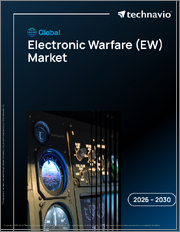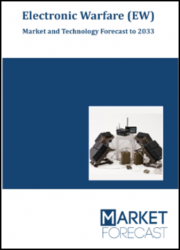
|
시장보고서
상품코드
1642628
전자전 시장 보고서 : 제품별, 장비별, 용량별, 플랫폼별, 지역별(2025-2033년)Electronic Warfare Market Report by Product, Equipment, Capacity, Platform, and Region 2025-2033 |
||||||
세계 전자전 시장 규모는 2024년 192억 달러에 달했습니다. IMARC Group은 2025년부터 2033년까지의 성장률(CAGR)은 4.14%로 2033년까지는 278억 달러에 달할 것으로 예측했습니다. 이 시장은 역동적인 위협 상황, 기술 혁신을 촉진하는 기술의 진보, 세계 군사 근대화의 노력에 의해 꾸준한 성장을 이루고 있으며, 방위군이 진화하는 전자적 위협에 대항하기 위한 첨단 시스템을 요구하고 있기 때문에 지속적인 성장을 이끌고 있습니다.
전자전 시장 분석 :
시장 성장과 규모 : 세계 시장은 국방예산 증가, 지정학적 긴장, 군사근대화의 필요성 등을 배경으로 강력한 성장을 이루고 있으며 시장 규모는 크게 확대되고 있습니다.
주요 시장 성장 촉진요인 : 주요 촉진요인은 진화하는 위협 상황, 기술 진보, 세계의 군사 근대화 구상 등을 포함하여 새로운 전자적 위협에 대항하기 위한 고급 전자전 능력의 필요성을 반영합니다.
기술 진보 : 인공지능, 머신러닝, 지향성 에너지 무기 등의 분야에서 지속적인 기술 진보는 보다 정교하고 효과적인 전자전 시스템의 개발에 기여하고 전반적인 능력을 향상시킵니다.
산업용도 : 전자전은 육상, 해상, 공중, 우주 등 다양한 플랫폼에서 응용되어 군사 자산을 보호하고 전자기 스펙트럼에서 우위를 달성하기 위한 범용성을 반영합니다.
주요 시장 동향 : 현재의 동향은 전자 보호, 공동 방어 구상을 위한 국가 간 협력, 지향성 에너지 무기와 같은 혁신적인 기술의 통합에 중점을 두고 있으며, 전자전의 실천이 역동적으로 진화하고 있음을 돋보이게 합니다.
지리적 동향 : 지리적 동향에서는 북미가 가장 큰 시장 부문이며, 많은 국방 예산이 그 원동력이 되고 있습니다. 한편 아시아태평양은 국방지출 증가와 군사근대화 노력으로 급성장하고 있는 지역입니다.
경쟁 구도 : 경쟁 구도의 특징은 주요 기업이 시장에서 경쟁력을 유지하기 위해 연구 개발, 제휴, 포트폴리오 확대에 적극적으로 투자하고 있다는 것입니다.
과제와 기회 : 과제는 데이터 보안에 대한 우려, 변화에 대한 저항, 보급의 필요성 등을 포함합니다. 한편, 기회는 지속가능성에 초점을 맞춘 솔루션, 진화하는 소비자 수요에 대한 대응, 세계 공급망의 복잡성 극복 등을 포함합니다.
미래 전망 : 세계 시장 전망은 유망하며, 산업계가 첨단 전자전 솔루션을 선호함에 따라 지속적인 성장이 예상됩니다. 기술적 진보의 지속, 용도의 확대, 지속가능성에 중점을 두어 시장은 향후 수년간 지속적인 진화와 혁신을 이룰 것입니다.
전자전 시장 경향 :
진화하는 위협 상황
역동적으로 진화하는 위협 상황은 전자전 시장의 주요 촉진요인입니다. 지정학적 긴장이 지속되고 기술적 진보가 진행됨에 따라 적은 끊임없이 고급 전자적 위협을 개발하고 있습니다. 여기에는 레이더 방해, 통신 방해, 전자 모니터링 등이 포함됩니다. 이러한 진화하는 위협에 대항하기 위해 세계 국방군은 첨단 전자전 시스템에 투자하여 시장의 혁신과 개척을 촉진하고 있습니다. 이러한 투자는 새로운 전자적 위협을 효과적으로 감지, 분석 및 무력화하는 전자전 시스템의 능력을 강화하기 위한 것입니다. 새로운 주파수와 통신 프로토콜이 출현함에 따라 적응성이 뛰어나고 민첩한 전자전 솔루션의 필요성이 가장 중요해집니다. 또한 인공지능과 머신러닝 기술을 이러한 시스템에 통합함으로써 실시간 위협 분석과 대응이 가능해지고 있습니다. 정부, 방위 관련 기업, 기술 기업의 연계는 전자전의 진보를 더욱 가속화하고 적의 앞으로 가는 것에 중점을 둔 견고한 생태계를 구축하고 있습니다. 이 끊임없는 혁신의 주기는 세계적으로 변화하는 세계 상황 속에서 국가 안보를 유지하는데 있어서 전자전이 이끄는 중요한 역할을 부각하고 있습니다.
급속한 기술 진보와 혁신
기술 진보의 급속한 속도는 전자전 시장을 추진하는 중요한 요소입니다. 신호 처리, 인공지능, 머신러닝 및 센서 기능의 발전은 전자 전투 시스템의 효율성을 향상시킵니다. 인지 전자전과 같은 혁신적인 솔루션은 새로운 위협에 실시간 적응을 가능하게 하고 전자전 공간에서 결정적인 이점을 제공합니다. 방위군이 최첨단의 전자전 능력을 요구하는 가운데, 기술 혁신과 최첨단 기술에 대한 끊임없는 의욕이 시장의 성장을 지지하고 있습니다.
현대화 이니셔티브 증가와 지정학적 긴장
세계의 지정학적 긴장과 군사적 현대화 이니셔티브의 필요성은 전자전 시장을 자극하는 주요 촉진요인입니다. 세계 각국은 새로운 위협에 대처하고 전략적 태세를 강화하기 위해 방어 능력의 현대화를 추진하고 있습니다. 지정학적 기업 간의 적대관계가 격화되는 가운데 경쟁 환경에서 우위를 차지하기 위해 전자전 시스템에 대한 주목이 높아지고 있습니다. 이러한 지정학적 배경은 전자전 기술에 많은 투자를 촉구하고 첨단 전자전 솔루션의 개발과 전개를 위한 견고한 시장환경을 만들어 내고 있습니다.
목차
제1장 서문
제2장 조사 범위와 조사 방법
- 조사의 목적
- 이해관계자
- 데이터 소스
- 1차 정보
- 2차 정보
- 시장 추정
- 상향식 접근
- 하향식 접근
- 예측 방법
제3장 주요 요약
제4장 소개
- 개요
- 주요 업계 동향
제5장 세계의 전자전 시장
- 시장 개요
- 시장 실적
- COVID-19의 영향
- 시장 예측
제6장 시장 분석 : 제품별
- 전자전 장비
- 시장 동향
- 시장 예측
- 전자전 운영 지원
- 시장 동향
- 시장 예측
제7장 시장 분석 : 장비별
- 재머
- 시장 동향
- 시장 예측
- 대응 시스템
- 시장 동향
- 시장 예측
- 디코이
- 시장 동향
- 시장 예측
- 지향성 에너지 무기
- 시장 동향
- 시장 예측
- 기타
- 시장 동향
- 시장 예측
제8장 시장 분석 : 용량별
- 전자 보호
- 시장 동향
- 시장 예측
- 전자 서포트
- 시장 동향
- 시장 예측
- 전자 공격
- 시장 동향
- 시장 예측
제9장 시장 분석 : 플랫폼별
- 육상
- 시장 동향
- 시장 예측
- 해군
- 시장 동향
- 시장 예측
- 공중
- 시장 동향
- 시장 예측
- 우주
- 시장 동향
- 시장 예측
제10장 시장 분석 : 지역별
- 북미
- 미국
- 캐나다
- 아시아태평양
- 중국
- 일본
- 인도
- 한국
- 호주
- 인도네시아
- 기타
- 유럽
- 독일
- 프랑스
- 영국
- 이탈리아
- 스페인
- 러시아
- 기타
- 라틴아메리카
- 브라질
- 멕시코
- 기타
- 중동 및 아프리카
- 시장 동향
- 시장 분석 : 국가별
- 시장 예측
제11장 SWOT 분석
- 개요
- 강점
- 약점
- 기회
- 위협
제12장 밸류체인 분석
제13장 Porter's Five Forces 분석
- 개요
- 구매자의 협상력
- 공급기업의 협상력
- 경쟁도
- 신규 참가업체의 위협
- 대체품의 위협
제14장 가격 분석
제15장 경쟁 구도
- 시장 구조
- 주요 기업
- 주요 기업 프로파일
- Aselsan AS
- BAE Systems plc
- Elbit Systems Ltd.
- General Dynamics Corporation
- Israel Aerospace Industries
- L3Harris Technologies Inc.
- Leonardo SpA
- Lockheed Martin Corporation
- Northrop Grumman Corporation
- Raytheon Technologies Corporation
- Saab AB
- Teledyne Technologies Incorporated
- Textron Inc.
- Thales Group
- The Boeing Company
The global electronic warfare market size reached USD 19.2 Billion in 2024. Looking forward, IMARC Group expects the market to reach USD 27.8 Billion by 2033, exhibiting a growth rate (CAGR) of 4.14% during 2025-2033. The market is experiencing steady growth driven by a dynamic threat landscape, technological advancements fostering innovation, and global military modernization initiatives, driving sustained growth as defense forces seek advanced systems to counter evolving electronic threats.
Electronic Warfare Market Analysis:
Market Growth and Size: The global market is experiencing robust growth, driven by increasing defense budgets, geopolitical tensions, and the imperative for military modernization, resulting in a substantial expansion in market size.
Major Market Drivers: Key drivers include the evolving threat landscape, technological advancements, and global military modernization initiatives, reflecting the necessity for advanced electronic warfare capabilities to counter emerging electronic threats.
Technological Advancements: Ongoing technological advancements in areas such as artificial intelligence, machine learning, and directed energy weapons contribute to the development of more sophisticated and effective electronic warfare systems, enhancing their overall capabilities.
Industry Applications: Electronic warfare finds applications across diverse platforms, including land, naval, airborne, and space, reflecting its versatility in safeguarding military assets and achieving superiority in the electromagnetic spectrum.
Key Market Trends: Current trends involve a focus on electronic protection, collaboration between nations for joint defense initiatives, and the integration of innovative technologies like directed energy weapons, highlighting the dynamic evolution of electronic warfare practices.
Geographical Trends: Geographical trends indicate North America as the largest market segment, driven by substantial defense budgets, while Asia Pacific emerges as a rapidly growing region, marked by increasing defense expenditures and military modernization efforts.
Competitive Landscape: The competitive landscape features major players actively investing in research and development, collaborations, and portfolio expansions to maintain a competitive edge in the market.
Challenges and Opportunities: Challenges include data security concerns, resistance to change, and the need for widespread adoption, while opportunities lie in sustainability-focused solutions, meeting evolving consumer demands, and navigating global supply chain complexities.
Future Outlook: The future outlook for the global market is promising, with sustained growth anticipated as industries prioritize advanced electronic warfare solutions. Continued technological advancements, expanding applications, and a focus on sustainability position the market for continued evolution and innovation in the coming years.
Electronic Warfare Market Trends:
Evolving threat landscape
The dynamic and evolving threat landscape is a primary driver of the electronic warfare (EW) market. As geopolitical tensions persist and technological advancements proliferate, adversaries continually develop sophisticated electronic threats. This includes radar jamming, communications disruption, and electronic surveillance. To counter these evolving threats, defense forces worldwide are investing in advanced electronic warfare systems, fostering innovation and development in the market. These investments aim to enhance the capability of electronic warfare systems to detect, analyze, and neutralize emerging electronic threats effectively. As new frequencies and communication protocols emerge, the need for adaptable and agile electronic warfare solutions becomes paramount. Additionally, the integration of artificial intelligence and machine learning technologies into these systems is gaining prominence, enabling real-time threat analysis and response. The collaboration between governments, defense contractors, and technology companies further accelerates advancements in electronic warfare, creating a robust ecosystem focused on staying ahead of adversaries. This continuous cycle of innovation underscores the critical role electronic warfare plays in maintaining national security in an ever-changing global landscape.
Rapid technological advancements and innovations
The rapid pace of technological advancements is a significant factor propelling the electronic warfare market. Advances in signal processing, artificial intelligence, machine learning, and sensor capabilities enhance the effectiveness of electronic warfare systems. Innovative solutions, such as cognitive electronic warfare, enable real-time adaptation to emerging threats, providing a crucial advantage in electronic battlespaces. The constant drive for innovation and cutting-edge technologies sustains the market's growth as defense forces seek state-of-the-art electronic warfare capabilities.
Rising modernization initiatives and geopolitical tensions
Global geopolitical tensions and the imperative for military modernization initiatives are key drivers stimulating the electronic warfare market. Nations worldwide are modernizing their defense capabilities to address emerging threats and enhance their strategic posture. As geopolitical rivalries intensify, there is a heightened focus on electronic warfare systems to gain a competitive edge in contested environments. This geopolitical context drives substantial investments in electronic warfare technologies, creating a robust market environment for the development and deployment of advanced electronic warfare solutions.
Electronic Warfare Industry Segmentation:
Breakup by Product:
EW Equipment
EW Operational Support
Breakup by Equipment:
Jammer
Countermeasure System
Decoy
Directed Energy Weapon
Others
Breakup by Capacity:
Electronic Protection
Electronic Support
Electronic Attack
Breakup by Platform:
Land
Naval
Airborne
Space
Breakup by Region:
North America
United States
Canada
Asia-Pacific
China
Japan
India
South Korea
Australia
Indonesia
Others
Europe
Germany
France
United Kingdom
Italy
Spain
Russia
Others
Latin America
Brazil
Mexico
Others
Middle East and Africa
The market research report has also provided a comprehensive analysis of all the major regional markets, which include North America (the United States and Canada); Europe (Germany, France, the United Kingdom, Italy, Spain, Russia, and others); Asia Pacific (China, Japan, India, South Korea, Australia, Indonesia, and others); Latin America (Brazil, Mexico, and others); and the Middle East and Africa.
The market research report has provided a comprehensive analysis of the competitive landscape. Detailed profiles of all major companies have also been provided. Some of the key players in the market include:
Aselsan A.S
BAE Systems plc
Elbit Systems Ltd.
General Dynamics Corporation
Israel Aerospace Industries
L3Harris Technologies Inc.
Leonardo S.p.A.
Lockheed Martin Corporation
Northrop Grumman Corporation
Raytheon Technologies Corporation
Saab AB
Teledyne Technologies Incorporated
Textron Inc.
Thales Group
The Boeing Company.
Key Questions Answered in This Report
- 1. What was the size of the global electronic warfare market in 2024?
- 2. What is the expected growth rate of the global electronic warfare market during 2025-2033?
- 3. What are the key factors driving the global electronic warfare market?
- 4. What has been the impact of COVID-19 on the global electronic warfare market?
- 5. What is the breakup of the global electronic warfare market based on the product?
- 6. What is the breakup of the global electronic warfare market based on the capacity?
- 7. What is the breakup of the global electronic warfare market based on the platform?
- 8. What are the key regions in the global electronic warfare market?
- 9. Who are the key players/companies in the global electronic warfare market?
Table of Contents
1 Preface
2 Scope and Methodology
- 2.1 Objectives of the Study
- 2.2 Stakeholders
- 2.3 Data Sources
- 2.3.1 Primary Sources
- 2.3.2 Secondary Sources
- 2.4 Market Estimation
- 2.4.1 Bottom-Up Approach
- 2.4.2 Top-Down Approach
- 2.5 Forecasting Methodology
3 Executive Summary
4 Introduction
- 4.1 Overview
- 4.2 Key Industry Trends
5 Global Electronic Warfare Market
- 5.1 Market Overview
- 5.2 Market Performance
- 5.3 Impact of COVID-19
- 5.4 Market Forecast
6 Market Breakup by Product
- 6.1 EW Equipment
- 6.1.1 Market Trends
- 6.1.2 Market Forecast
- 6.2 EW Operational Support
- 6.2.1 Market Trends
- 6.2.2 Market Forecast
7 Market Breakup by Equipment
- 7.1 Jammer
- 7.1.1 Market Trends
- 7.1.2 Market Forecast
- 7.2 Countermeasure System
- 7.2.1 Market Trends
- 7.2.2 Market Forecast
- 7.3 Decoy
- 7.3.1 Market Trends
- 7.3.2 Market Forecast
- 7.4 Directed Energy Weapon
- 7.4.1 Market Trends
- 7.4.2 Market Forecast
- 7.5 Others
- 7.5.1 Market Trends
- 7.5.2 Market Forecast
8 Market Breakup by Capacity
- 8.1 Electronic Protection
- 8.1.1 Market Trends
- 8.1.2 Market Forecast
- 8.2 Electronic Support
- 8.2.1 Market Trends
- 8.2.2 Market Forecast
- 8.3 Electronic Attack
- 8.3.1 Market Trends
- 8.3.2 Market Forecast
9 Market Breakup by Platform
- 9.1 Land
- 9.1.1 Market Trends
- 9.1.2 Market Forecast
- 9.2 Naval
- 9.2.1 Market Trends
- 9.2.2 Market Forecast
- 9.3 Airborne
- 9.3.1 Market Trends
- 9.3.2 Market Forecast
- 9.4 Space
- 9.4.1 Market Trends
- 9.4.2 Market Forecast
10 Market Breakup by Region
- 10.1 North America
- 10.1.1 United States
- 10.1.1.1 Market Trends
- 10.1.1.2 Market Forecast
- 10.1.2 Canada
- 10.1.2.1 Market Trends
- 10.1.2.2 Market Forecast
- 10.1.1 United States
- 10.2 Asia-Pacific
- 10.2.1 China
- 10.2.1.1 Market Trends
- 10.2.1.2 Market Forecast
- 10.2.2 Japan
- 10.2.2.1 Market Trends
- 10.2.2.2 Market Forecast
- 10.2.3 India
- 10.2.3.1 Market Trends
- 10.2.3.2 Market Forecast
- 10.2.4 South Korea
- 10.2.4.1 Market Trends
- 10.2.4.2 Market Forecast
- 10.2.5 Australia
- 10.2.5.1 Market Trends
- 10.2.5.2 Market Forecast
- 10.2.6 Indonesia
- 10.2.6.1 Market Trends
- 10.2.6.2 Market Forecast
- 10.2.7 Others
- 10.2.7.1 Market Trends
- 10.2.7.2 Market Forecast
- 10.2.1 China
- 10.3 Europe
- 10.3.1 Germany
- 10.3.1.1 Market Trends
- 10.3.1.2 Market Forecast
- 10.3.2 France
- 10.3.2.1 Market Trends
- 10.3.2.2 Market Forecast
- 10.3.3 United Kingdom
- 10.3.3.1 Market Trends
- 10.3.3.2 Market Forecast
- 10.3.4 Italy
- 10.3.4.1 Market Trends
- 10.3.4.2 Market Forecast
- 10.3.5 Spain
- 10.3.5.1 Market Trends
- 10.3.5.2 Market Forecast
- 10.3.6 Russia
- 10.3.6.1 Market Trends
- 10.3.6.2 Market Forecast
- 10.3.7 Others
- 10.3.7.1 Market Trends
- 10.3.7.2 Market Forecast
- 10.3.1 Germany
- 10.4 Latin America
- 10.4.1 Brazil
- 10.4.1.1 Market Trends
- 10.4.1.2 Market Forecast
- 10.4.2 Mexico
- 10.4.2.1 Market Trends
- 10.4.2.2 Market Forecast
- 10.4.3 Others
- 10.4.3.1 Market Trends
- 10.4.3.2 Market Forecast
- 10.4.1 Brazil
- 10.5 Middle East and Africa
- 10.5.1 Market Trends
- 10.5.2 Market Breakup by Country
- 10.5.3 Market Forecast
11 SWOT Analysis
- 11.1 Overview
- 11.2 Strengths
- 11.3 Weaknesses
- 11.4 Opportunities
- 11.5 Threats
12 Value Chain Analysis
13 Porters Five Forces Analysis
- 13.1 Overview
- 13.2 Bargaining Power of Buyers
- 13.3 Bargaining Power of Suppliers
- 13.4 Degree of Competition
- 13.5 Threat of New Entrants
- 13.6 Threat of Substitutes
14 Price Analysis
15 Competitive Landscape
- 15.1 Market Structure
- 15.2 Key Players
- 15.3 Profiles of Key Players
- 15.3.1 Aselsan A.S.
- 15.3.1.1 Company Overview
- 15.3.1.2 Product Portfolio
- 15.3.1.3 Financials
- 15.3.2 BAE Systems plc
- 15.3.2.1 Company Overview
- 15.3.2.2 Product Portfolio
- 15.3.2.3 Financials
- 15.3.2.4 SWOT Analysis
- 15.3.3 Elbit Systems Ltd.
- 15.3.3.1 Company Overview
- 15.3.3.2 Product Portfolio
- 15.3.3.3 Financials
- 15.3.4 General Dynamics Corporation
- 15.3.4.1 Company Overview
- 15.3.4.2 Product Portfolio
- 15.3.4.3 Financials
- 15.3.4.4 SWOT Analysis
- 15.3.5 Israel Aerospace Industries
- 15.3.5.1 Company Overview
- 15.3.5.2 Product Portfolio
- 15.3.6 L3Harris Technologies Inc.
- 15.3.6.1 Company Overview
- 15.3.6.2 Product Portfolio
- 15.3.6.3 Financials
- 15.3.7 Leonardo S.p.A.
- 15.3.7.1 Company Overview
- 15.3.7.2 Product Portfolio
- 15.3.7.3 Financials
- 15.3.7.4 SWOT Analysis
- 15.3.8 Lockheed Martin Corporation
- 15.3.8.1 Company Overview
- 15.3.8.2 Product Portfolio
- 15.3.8.3 Financials
- 15.3.8.4 SWOT Analysis
- 15.3.9 Northrop Grumman Corporation
- 15.3.9.1 Company Overview
- 15.3.9.2 Product Portfolio
- 15.3.9.3 Financials
- 15.3.9.4 SWOT Analysis
- 15.3.10 Raytheon Technologies Corporation
- 15.3.10.1 Company Overview
- 15.3.10.2 Product Portfolio
- 15.3.10.3 Financials
- 15.3.10.4 SWOT Analysis
- 15.3.11 Saab AB
- 15.3.11.1 Company Overview
- 15.3.11.2 Product Portfolio
- 15.3.11.3 Financials
- 15.3.11.4 SWOT Analysis
- 15.3.12 Teledyne Technologies Incorporated
- 15.3.12.1 Company Overview
- 15.3.12.2 Product Portfolio
- 15.3.12.3 Financials
- 15.3.12.4 SWOT Analysis
- 15.3.13 Textron Inc.
- 15.3.13.1 Company Overview
- 15.3.13.2 Product Portfolio
- 15.3.13.3 Financials
- 15.3.13.4 SWOT Analysis
- 15.3.14 Thales Group
- 15.3.14.1 Company Overview
- 15.3.14.2 Product Portfolio
- 15.3.14.3 Financials
- 15.3.14.4 SWOT Analysis
- 15.3.15 The Boeing Company
- 15.3.15.1 Company Overview
- 15.3.15.2 Product Portfolio
- 15.3.15.3 Financials
- 15.3.15.4 SWOT Analysis
- 15.3.1 Aselsan A.S.

















